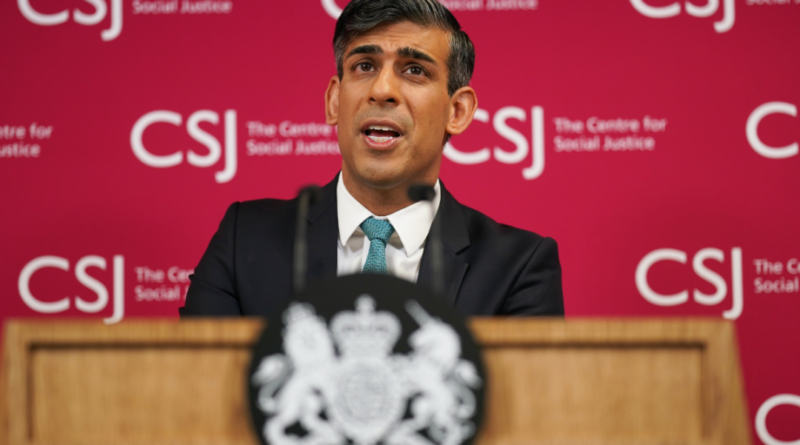Sunak: Changes to Welfare System Aim to Eliminate Dependence on Sick Notes
The prime minister has announced reforms aimed at helping more people get back into work, stating that the current situation is economically unsustainable.
Prime Minister Rishi Sunak has pledged to put an end to the UK’s “sick note culture,” highlighting that 94 percent of the 11 million Fit Notes issued last year were deemed “not fit for work.”
In a speech at the Centre for Social Justice think tank, Mr. Sunak outlined various reforms, including initiatives to assist more individuals on disability benefits in rejoining the workforce.
Mr. Sunak emphasized the need to shift the default focus from what work individuals can’t do to what they can do, stating, “We need to change the sick note culture.”
He warned that neglecting to address the rising number of economically inactive individuals would not only fail those in need of support but also lead to a sense of unfairness among taxpayers funding the social safety net.
The prime minister stressed the economic unsustainability of the current situation.
The prime minister unveiled these reforms amid concerns that an additional 850,000 individuals have become economically inactive due to long-term sickness since the onset of the COVID-19 lockdowns. Of those out of work, half reported anxiety or depression. The spike in Britons out of work due to long-term sickness has been most prominent among young people.
Shifting Responsibility From GPs
Under the proposed changes, the Fit Note system will be transferred from GPs to specialist work and health professionals. The government stated that these professionals would offer an impartial assessment of an individual’s work ability and the tailored support they may require.
Additional reforms involve tightening the Work Capacity Assessment to gauge individuals’ work potential accurately. This means that many benefit recipients with less severe conditions will be expected to return to work and receive support to do so.
Expectations for benefit recipients capable of working will also be heightened, requiring them to put in more hours. Those who do not comply with their work coach’s conditions, such as accepting available jobs, will have their benefits revoked after a year.
Personal Independence Payments (PIPs) will undergo reforms to offer more tailored support to individuals based on their specific needs and conditions.
The government also plans to crackdown on benefit fraud.
These reforms are scheduled for the next Parliament if the Conservatives win the general election.
Unsustainable Current State
Speaking at the Centre for Social Justice, Mr. Sunak highlighted that the UK spends £69 billion on benefits for working-age individuals with disabilities or health conditions. He emphasized that this sum exceeds budgets for schools, transport, and policing.
Mr. Sunak also noted that spending on PIPs is set to increase by more than 50 percent in the next four years.

He expressed that the current state is unsustainable, unfair to taxpayers, and detrimental to future generations.
“We can’t afford such an escalating rise in welfare expenditures and the irresponsible burden it would place on current and future taxpayers,” he emphasized.
Criticism and Concerns
Scope, a charity advocating for fair treatment of individuals with disabilities, viewed the proposals as an “assault on disabled people.”
The charity criticized the potential impact of slashing personal independence payment (PIP) on disabled individuals during a cost-of-living crisis.
Dr. Katie Bramall-Stainer, chairwoman of the British Medical Association’s General Practitioners Council in England (GPC England), raised concerns about the “hostile rhetoric” surrounding the “sick note culture.”
She emphasized the critical role GPs play in providing careful consideration before issuing Fit Notes, highlighting the importance of prompt care for individuals unable to work due to health issues.
Dr. Bramall-Stainer urged focusing on removing barriers to receiving necessary physical and mental health care rather than adopting hostile rhetoric.
Challenges Ahead
The Resolution Foundation think tank warned of the need to revise the Universal Credit benefits system to accommodate the growing number of individuals with ill health or disabilities.





